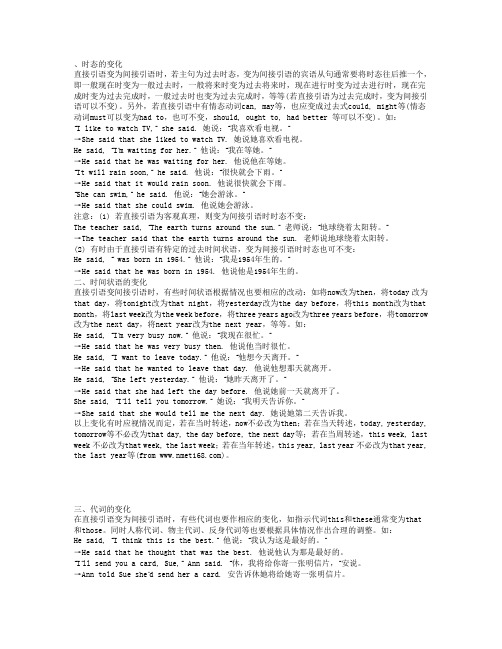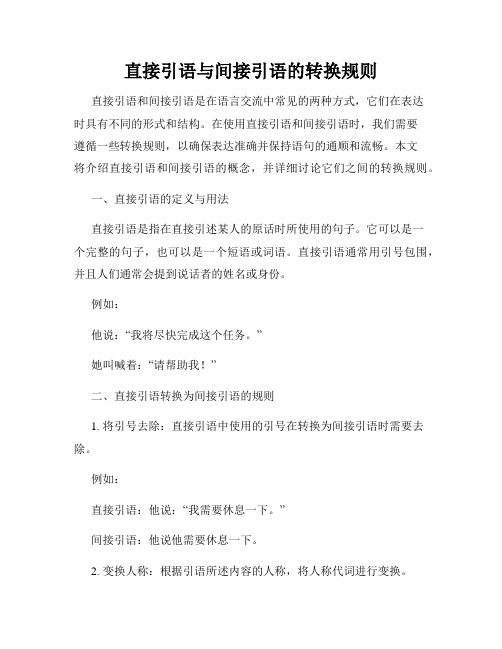把间接引语改为直接引语
直接引语和间接引语的转换技巧

直接引语和间接引语的转换技巧引语是指在文章中引用其他人的语言或观点来支持自己的论述。
在写作过程中,我们常常需要将别人的直接引语转换为间接引语,或者将间接引语转换为直接引语。
掌握正确的转换技巧可以使文章表达更加准确和流畅。
以下是直接引语和间接引语的转换技巧。
一、将直接引语转换为间接引语1. 改变人称和时态当将直接引语转换为间接引语时,要根据引语的内容改变人称和时态。
通常情况下,第一人称要改为第三人称,而时态则需要根据引语所述的时间进行调整。
例如,直接引语:“我喜欢读书。
”可以转换为间接引语:“他说他喜欢读书。
”2. 使用适当的引导词在引用别人的观点时,为了明确引语和原文之间的关系,常常需要使用适当的引导词。
常见的引导词包括:“说道”、“表示”、“认为”、“指出”等。
例如,直接引语:“我认为这个问题很重要。
”可以转换为间接引语:“他认为这个问题很重要。
”3. 修改动词的时态和语态在转换为间接引语时,有时候需要根据原文的动词时态和语态进行调整。
例如,直接引语:“我去了图书馆。
”可以转换为间接引语:“他说他已经去了图书馆。
”二、将间接引语转换为直接引语1. 删除引导词当将间接引语转换为直接引语时,通常可以删除引导词,使引语更加简洁明确。
例如,间接引语:“他说他没时间。
”可以转换为直接引语:“我没时间。
”2. 修改人称和时态在转换为直接引语时,要根据引语的内容修改人称和时态。
通常情况下,第三人称要改为第一人称,而时态则需要根据引语所述的时间进行调整。
例如,间接引语:“他说他去过中国。
”可以转换为直接引语:“我去过中国。
”3. 适当添加语气词和修饰词为了更好地表达原文的语气和意思,转换为直接引语时,可以适当添加语气词和修饰词。
例如,间接引语:“他说他很高兴。
”可以转换为直接引语:“我当时真的很高兴。
”总结:在转换直接引语和间接引语时,需要注意调整人称、时态和语气,并且使用适当的引导词。
通过灵活运用这些转换技巧,可以使文章更加丰富多样,语言表达更加准确清晰。
间接引语变为直接引语

、时态的变化直接引语变为间接引语时,若主句为过去时态,变为间接引语的宾语从句通常要将时态往后推一个,即一般现在时变为一般过去时,一般将来时变为过去将来时,现在进行时变为过去进行时,现在完成时变为过去完成时,一般过去时也变为过去完成时,等等(若直接引语为过去完成时,变为间接引语可以不变)。
另外,若直接引语中有情态动词can, may等,也应变成过去式could, might等(情态动词must可以变为had to,也可不变,should, ought to, had better 等可以不变)。
如:“I like to watch TV,” she said. 她说:“我喜欢看电视。
”→She said that she liked to watch TV. 她说她喜欢看电视。
He said, “I’m waiting for her.”他说:“我在等她。
”→He said that he was waiting for her. 他说他在等她。
“It will rain soon,” he said. 他说:“很快就会下雨。
”→He said that it would rain soon. 他说很快就会下雨。
“She can swim,” he said. 他说:“她会游泳。
”→He said that she could swim. 他说她会游泳。
注意:(1) 若直接引语为客观真理,则变为间接引语时时态不变:The teacher said, “The earth turns around the sun.”老师说:“地球绕着太阳转。
”→The teacher said that the earth turns around the sun. 老师说地球绕着太阳转。
(2) 有时由于直接引语有特定的过去时间状语,变为间接引语时时态也可不变:He said, “ was born in 1954.”他说:“我是1954年生的。
直接引语和间接引语之间的转换

直接引语和间接引语之间的转换一、把下列句子变成间接引语:1. Mary often says, “I want to be a doctor when I grow up.”→Mary often says that she wants to be a doctor when she grows up.2. Mr Smith said, “John is a good student.”→Mr Smith said that John was a good student.3. “We will come here again tonight,” the students said to the teacher.→The students told the teacher that they would go there again that night.4. He said,“I repaired the watch yesterday.”→He said that he had repaired the watch the day before.”5. “I haven’t heard from my parents these days,” he said.→He said that he hadn’t heard from his parents those days.6. The children said,“We’ll be back tomorrow.”→The children said that they would be back the next day.”7. Bob said to Mary,“I saw the film two days ago.”→Bob told Mary that he had seen the film two days before.8. The teacher said,“Can you hear me, children?”→The teacher asked the children if they could hear him.9.“We’re going to study in the USA next month,”they said.→They said that they were going to study in the USA the next month.10. “I’m checking your homework now,”his mother said.→His mother said that she was checking his homework then.11. “The earth goes around the sun,” the teacher said.→The teacher said (that) the earth goes around the sun.12.“I can finish it in half an hour,” the worker said to me.→The worker told me he could finish it in half an hour.13.“Will you go to the station with me to meet a friend of mine this afternoon?” he asked me.→He asked me if I would go to the station with him to meet a friend of his that afternoon.14.“Do you remember what your uncle told you last night?” Li Ping’s father asked him.→Li Ping’s father asked him if he remembered what his uncle told him the night before.15.“Why did she refuse to go there?” the teacher asked.→The teacher asked why she had refused to go there.16.“Please wait for me at the gate of the Summer Palace at two tomorrow afternoon,” Kate said to her friend.→Kate asked her friend to wait for her at the gate of the Summer Palace at two the next afternoon.17.“Are you feeling better today?” the doctor asked my sister.→The doctor asked my sister if she was feeling better that day.18. He said to me,“Where did you go last week?”→He asked me where had I had gone the week before.19. He said,“I joined the English Club in 2007.”→He said that he joined the English Club in 2007.20. John said to me,“Where will you go this Sunday?”→John asked me where I would go that Sunday.21.She said,“I will come this evening.”→She said that she would go that evening.22.“Had you finished your homework before you watched TV?” Kate’s mother asked her.→Kate’s mother asked her if she had finished her homework before she watched TV.二、把下列句子变成直接引语:1. He said he knew nothing about Tom.→He said,“I know nothing about Tom.”2. Tom asked Mary if she would watch his CD-ROMs that day.→Tom said to Mary,“Will you watch my CD-ROMs today?”3. Tom’s mother asked him why he has made so many mistakes in his homework that time.→Tom’s mother said to him,“Why have you made so many mistakes in your homework this time?”→Tom’s mother asked,“T om, Why have you made so many mistakes in your homework this time?”4. They said they had studied English for three years.→They said,“We have studied English for three years.”5. He told me there would be a basketball match that afternoon.→He said to me,“There will be a basketball match this afternoon.”6. Uncle Wang asked me where my father had been and what he had been doing all those days. →Uncle Wang asked me,“Where has your father been and what has he been doing all these days?”7. He said he had seen the film that day.→He said,“I saw the film yesterday.”8. He said he had finished the work that day.→He said,“I have finished the work today.”9. He told his little son to go inside and not come out until the rain had stopped.→He told his little son,“Go inside and don’t come out until the rain has stopped.”10. The conductor asked Zhang Hong where she was going to get off.→The conductor said to Zhang Hong,“Where are you going to get off ?”11. He asked whether they would go with him.→He asked,“Will you go with me?”12. Mr White asked me to give his wife a message when she returned from the library.→Mr White said to me,“Please give my wife a message when she returns from the library.”13. A asked the teacher whether Gauss was born in 1777.→A asked the teacher,“Was Gauss born in 1777?”14. The old worker told us not to forget the past.→The old worker sad to us,“Don’t forget the past.”15. He asked me Why Eidson’s teacher said that he wasn’t bright and wasn’t worth teaching. →He asked me,“Why did Eidson’s teacher said that he wasn’t bright and wasn’t worth teaching?”16. He asked me what else I wanted him to do.→He asked me,“what else do you want me to do?”17. She asked Xiao Wang if that kind of telephone was made in Guangzhou.→She asked Xiao Wang,“Is this kind telephone made in Guangzhou? ”18. He asked me how many times I had been to my home town since 2000.→He asked me,“How many times have you been to your home town since 2000?”19. I asked one of the boys if there were any mistakes in his homework.→I asked one of the boys,“Are there any mistakes in your homework?”20. She told me she had seen a letter on my desk the day before.→“I saw a letter on your desk yesterday,”she said to me. 21. The guard said that he would not let him in if he had no pass. →The guard said,“I will not let you in if you have no pass.”。
直接引语与间接引语的转换规则

直接引语与间接引语的转换规则直接引语和间接引语是在语言交流中常见的两种方式,它们在表达时具有不同的形式和结构。
在使用直接引语和间接引语时,我们需要遵循一些转换规则,以确保表达准确并保持语句的通顺和流畅。
本文将介绍直接引语和间接引语的概念,并详细讨论它们之间的转换规则。
一、直接引语的定义与用法直接引语是指在直接引述某人的原话时所使用的句子。
它可以是一个完整的句子,也可以是一个短语或词语。
直接引语通常用引号包围,并且人们通常会提到说话者的姓名或身份。
例如:他说:“我将尽快完成这个任务。
”她叫喊着:“请帮助我!”二、直接引语转换为间接引语的规则1. 将引号去除:直接引语中使用的引号在转换为间接引语时需要去除。
例如:直接引语:他说:“我需要休息一下。
”间接引语:他说他需要休息一下。
2. 变换人称:根据引语所述内容的人称,将人称代词进行变换。
例如:直接引语:她说:“我不喜欢咖啡。
”间接引语:她说她不喜欢咖啡。
3. 时态的变化:根据引语所述的时间,在间接引语中进行时态的变化。
例如:直接引语:他说:“我正在读一本好书。
”间接引语:他说他正在读一本好书。
4. 介词的变化:根据引语中的介词,对间接引语中的介词进行适当的变化。
例如:直接引语:她说:“我想与你合作。
”间接引语:她说她想和你合作。
5. 引语的独立性:在转换为间接引语时,通常需要将引语结合到整个句子中,将其作为主句或从句的一部分。
例如:直接引语:他说:“我会尽快完成任务。
”间接引语:他说他会尽快完成任务。
三、例外情况和特殊情况1. 特殊疑问句的转换:在将特殊疑问句由直接引语转换为间接引语时,需要根据句子的语序和语态进行相应的转换。
例如:直接引语:他问:“你在哪里?”间接引语:他问我在哪里。
2. 祈使句的转换:祈使句的间接引语通常使用"告诉"或"要求"等动词进行引述。
例如:直接引语:他说:“快点来这里。
”间接引语:他告诉我快点去那里。
直接引语和间接引语的转换

直接引语和间接引语的转换作者:loveyourlife2006-10-07 21:04 星期六晴直接引语是直接引述别人的原话,原话要有引号。
直接引语变间接引语实际上是转述他人的陈述、疑惑或问题,不用引号。
间接引语在多数情况下构成宾语从句。
一、注意动词的变化一般说来,主句谓语动词常为said或said to,变为间接引语时,当直接引语是陈述句时,said变为said (that),而said to sb则变为told sb。
当直接引语是一般疑问句和特殊疑问句时,则要变为asked/asked sb+if/whether或asked sb+what等特殊疑问词引导的句子。
例如:He said to me, “She is a nurse.”→He told me she was nurseHe asked, “Can you come here?”→He asked me whether/if I could go there.二、注意人称的变化由直接引语变间接引语时,从句的主语人称要遵循一主、二宾、三不变的原则。
①直接引语的主语是第一人称变为间接引语时要和主句的主语保持一致。
②如果直接引语的主语是第二人称变为间接引语时要与主句的宾语保持一致。
③如果直接引语的主语是第三人称变为间接引语时,人称不变。
例如:She s aid to Jack, “How are you feeling now?”→She asked Jack how he was feeling then.“Have they tasted the mixture?” he asked.→He asked if they had tasted the mixture.三、注意动词时态的变化1. 直接引语变为间接引语时,如果主句中的谓语动词是一般现在时或一般将来时,则间接引语从句的时态保持不变。
例如:【考例】Can you make sure ________ the gold ring?(90全国)A. where Alice had putB. where had Alice putC. where Alice has putD. where has Alice put【解析】首先考虑的是间接引语部分需使用陈述词序,故排除B和D。
把间接引语改为直接引语

把间接引语改为直接引语;
1、妈妈严肃地对我说,马上就要期末考试了,我一定要认真复习,不要辜负老师和她对我的一片期望;
妈妈严肃地对我说:“马上就要期末考试了,你一定要认真复习,不要辜负老师和我对你的一片期望;”
2、他指着前面的一幢楼房说,这就是他的家;
他指着前面的一幢楼房说:“这就是我的家;”
3、小明对小山说,今晚,他到小山家写作业;
小明对小山说:“今晚,我到你家写作业;”
4、鲁迅说,他的信如果要发表,且有发表的地方,他可以同意;
鲁迅说:“我的信如果要发表,且有发表的地方,我可以同意;”
5、张明对王芳说,他今天中午要到商店买东西,回去可能要迟一点,请告诉他妈妈;
张明对王芳说:“我今天中午要到商店买东西,回去可能要迟一点,请告诉我妈妈;”
6、小明对小芳说,小芳的书包非常漂亮,他非常喜欢;
小明对小芳说:“你的书包非常漂亮,我非常喜欢;”7、雨来摇摇头说,他在屋里什么也没看见;
雨来摇摇头说:“我在屋里什么也没看见;”。
间接引语如何变直接引语方法

❤今日课程:直接引语与间接引语❤概述:我们把引述别人的话语可归纳为两种方式,一种时直接引述别人的话语,并置于引号之内的称为直接引语;另一种是用自己的语言转述别人的话语,称为间接引语,间接一般构成宾语从句。
例:“I remember I had seen you.” I said.“What’s your name?” she asked.Mary said she had already seen the film.He replied that he was going by train.➹1. 时态的变化一般现在时→一般过去时一般将来时→过去将来时现在进行时→过去进行时一般过去时→过去完成时现在完成时→过去完成时例:He said: “I came to help you.”” He said that he had come to help me.*直接引语如果是客观真理,变间接引语时,时态不变。
例:He said: “Light travels much faster than sound.”He said that light travels much faster than sound.➹2. 时间状语的变化now →then last month→the month before night→that night today→that day three days ago → three days before tomorrow→ the next daythis week→that week next month→the next month yesterday→the day before the day after t omorrow→in two days➹3. 地点状语的变化here→thereHe said, “My sister was here three days ago.”He said that his sister had been there three days before➹4. 谓语动词的变化come →goShe said, “I will come here tomorrow.”She said that she would go there the next day.➹5. 指示代词的变化this→that these→thoseShe said: “I will come this morning.” She said that she would go that morning.➹6. 人称的变化直接引语变间接引语相当于把直接引语变为宾语从句。
直接引语和间接引语互换

直接引语和间接引语互换直接叙述改为间接叙述的方法:1、把句中的第一人称(我、我们)改为第三人称(他、他们、她、她们)。
(注:若句中有第二人称“你”或“你们",应该认真分辨“你”或”你们”在句中指的是什么人,而后用具体的人名来转述;若没有具体所指,则不用变换。
)2、把句中“说"字后的冒号改为逗号,句中的双引号去掉。
间接叙述改为直接叙述的方法:1、把句中的第三人称(他、他们、她、她们)改为第一人称(我、我们). (注:若句中有具体人名或第一、三人称的,要将具体人名或第一、三人称改为第二人称(你、你们)。
)2、把句中“说”字后的逗号改为冒号并加上双引号。
转述的形式有(假定第一者、第二者、第三者):形式一:第一者(我)说的话,在他人的转述中,要把表示第一者的“我"改为“他"。
如:我说:“从今天起我要努力学习,取得好成绩。
"则可转述为:他说,从今天起他要努力学习,取得好成绩。
形式二:第二者对第一者说的话,由第一者转述,则转述中第一者“我”不变。
如:爸爸对我说:“我今天加班,晚上要晚些回来。
”这句话由“我”来转述给他人,则为:爸爸对我说,他今天加班,晚上要晚些回来.形式三:第二者对第一者说的话,由第三者转述,则转述中“我”则要改为“他”。
如:爸爸对我说:“我今天加班,晚上要晚些回来。
”这句话由第三者来转述,则为:爸爸对他说,他爸爸今天加班,晚上要晚些回来.(说明:在转述过程中,具体怎样把第一人称恰当地转为第三人称,要根据具体的语境,辨清人称所指,灵活进行转述。
)直接引语换成间接引语1、海力布急得掉下眼泪说:“我可以发誓,我说的话千真万确。
相信我的话吧,赶快搬走!”2、王老师对同学们说:“如果明天下雨,我们就不去秋游了.”3、那位年轻的母亲说:“你这么大年纪了,我站一会儿就行了。
”4、王军不好意思地说:“那次是我不好,不该弄坏你的钢笔。
"5、老师对我说:“你回去吧,我还要批改作业."6、萌萌把馍递给我:“老师,您几天都没吃饭了.您吃吧,吃了身体就有劲了。
- 1、下载文档前请自行甄别文档内容的完整性,平台不提供额外的编辑、内容补充、找答案等附加服务。
- 2、"仅部分预览"的文档,不可在线预览部分如存在完整性等问题,可反馈申请退款(可完整预览的文档不适用该条件!)。
- 3、如文档侵犯您的权益,请联系客服反馈,我们会尽快为您处理(人工客服工作时间:9:00-18:30)。
把间接引语改为直接引语:
1他指着前面的一幢楼房说,这就是他的家。
_______________________________ 2小明对小山说,今晚,他到小山家做作业。
_______________________________ 3老师关切地问我肚子是否还疼。
_______________________________ 4妈妈在电话里说,她要加班,七点左右才能到家,让我们先吃,不要等她。
5 医生关切地问:“小朋友,你好点
了没?”
6 战士们齐声说:“我们会战斗到底的!”
7 老师吩咐班长:“你一定要做好我今天交付给你的任务。
”
8 阿曼达对爸爸说:“我告诉同学们不要害怕,说只要我爸爸活着就一定会来救我,也能救大家。
因为你说过,不论发生什么,你总会和我在一起!”
9 父亲问阿曼达:“你现在怎么样?有几个孩子活着?”
10 “妈妈,您的意思是让我独自去医院看病?”他说。
